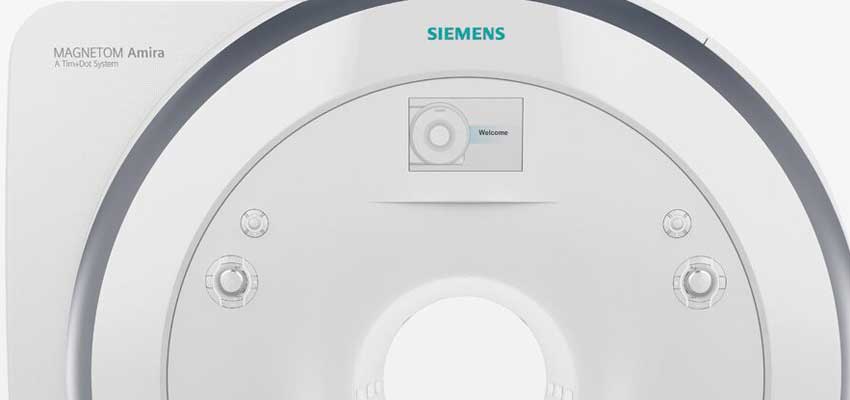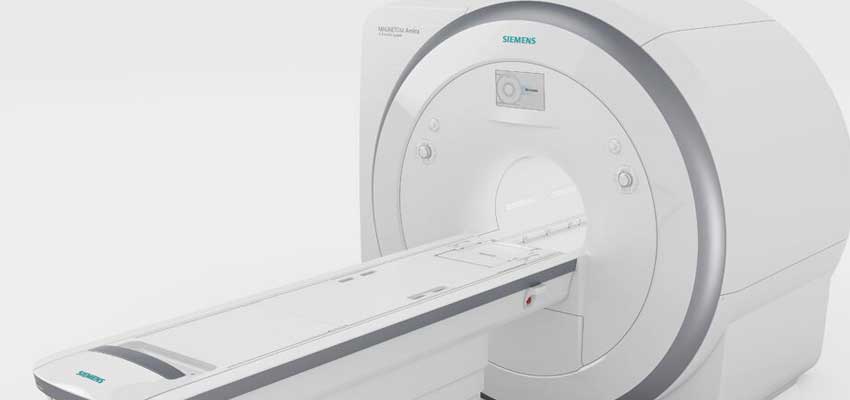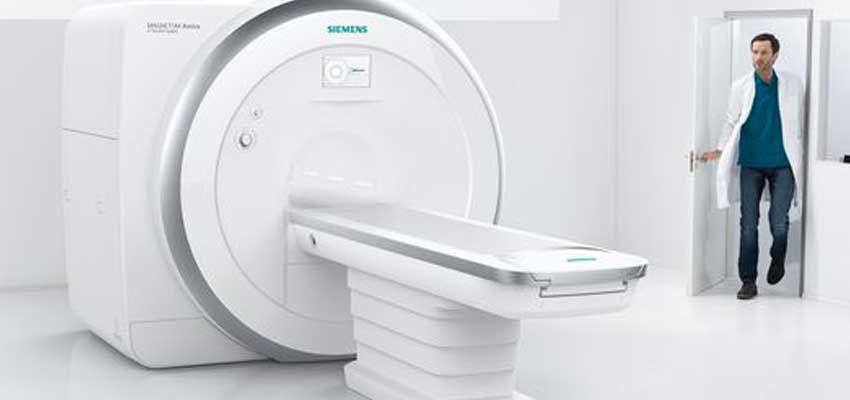Magnetic resonance imaging (MRI)
A magnetic resonance imaging (MRI) is an imaging test that uses powerful magnetic forces, radiofrequency (RF) waves and a computer to make detailed 3-dimensional pictures of the organs, bones and tissues inside your body. Some MRI scans require a contrast medium to provide clearer images. No ionizing radiation is used in MRI.
It is important to tell the MRI team if you have any metal in your body. The magnetic force is so strong that it can damage or dislodge some devices.
An MRI cannot be done if you have:
- an implant such as a cochlear (ear) implant
- some types of clips used for brain aneurysms
- some types of coils placed in blood vessels
- nearly any type of heart defibrillator or pacemaker
In most cases MRI can be done if you have joint replacements, artificial heart valves, implanted ports for drugs, implanted nerve stimulators or metal pins, screws, plates, stents or staples. Tooth fillings and braces are not often affected by the magnetic field, but they may distort images of the face or brain.
MRI is noisy with loud knocking or clanging sounds that you can hear during the scan. An MRI is a painless test.
Why an MRI is done
An MRI may be done to:
- assess different parts of the body and figure out if you have certain diseases
- diagnose cancer and figure out the stage (how far the cancer has spread)
- help plan cancer treatment
How an MRI is done
MRI is usually done as an outpatient basis. The test usually takes 30 to 50 minutes but may take up to 2 hours depending on the area being scanned. If you need a general anaesthetic, the test may take longer.
You should dress in comfortable clothing with no metal snaps or zippers. You may have to wear a gown, depending on the part of the body to be scanned. You’ll be asked to remove metal jewellery and any objects with a magnetic strip (such as bank cards or credit cards) from your pockets. These can interfere with the MRI. You may also be asked to remove some clothing.
Unless you are told otherwise, you can drink, eat and take medicines as you usually would.
Tell your doctor if you are having anxiety or are afraid of enclosed spaces (this is called claustrophobia). Some people may need sedation to relax and lie still for the whole test. Others may need a general anaesthesia. Both sedation and general anaesthesia will affect what you can eat or drink before the test.
If contrast medium will be used or you need a general anaesthetic, an IV will be started in your hand or arm. The contrast medium most commonly used is gadolinium.
During the MRI:
- You will lie on a movable exam table. Straps and pillows may be used to help you stay in the correct position and hold still during the exam. For an MRI of the head, a device is positioned around the head to hold it in place.
- The table slides into a narrow cylinder that houses the MRI scanning magnet.
- You will need to lie still inside the MRI machine while it takes pictures. Usually MRI scans include multiple sequences of pictures. Some sequences last for several minutes.
- You may be asked to hold your breath at times to help get a clearer picture.
Side effects
MRI uses no radiation and has no known harmful effects.
Some people may have a mild reaction to the contrast medium including:
- Nausea
- Dizziness
- Headache
- Taste of metal
- Pain where the needle was inserted
Talk to your doctor about side effects from sedation or general anaesthesia before the scan.
What the results mean
What the results mean
- A change in the shape, size or structure of tissues or organs
- A mass that could be a tumour (an MRI cannot always tell the difference between a cancerous tumour and a non-cancerous tumour)
- A tumour’s approximate shape, size and location
- Spread of a cancer within the body (metastasis)
- If the tumour has gotten smaller, stayed the same or grown after treatment
Special considerations for children
Preparing children before a test or procedure can lower anxiety, increase cooperation and help them develop coping skills. Preparation includes explaining to children what will happen during the test, including what they will see, feel, hear, taste or smell.
An MRI can be explained as a camera that looks like a tunnel. Reassure your child that the machine is noisy but does not hurt.
The child needs to lie still on the table during the MRI. Velcro straps may be used to help your child remain still and in position. Young children are usually given general anesthetic so they can remain still during the MRI.
If sedation or a general anesthetic is being used, the child may not be allowed to eat or drink for several hours before the test. They will have an IV if they have a general anesthetic or if contrast medium is used.
You can ask about being in the room with your child if you think that would be helpful.



